#variant rules
Text
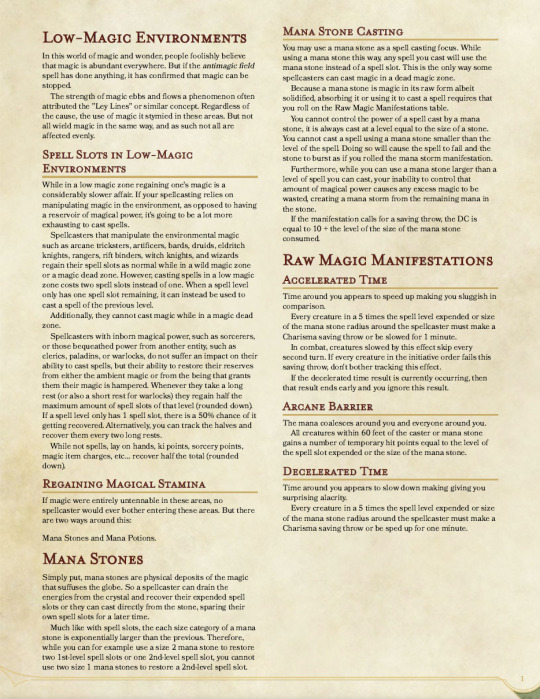

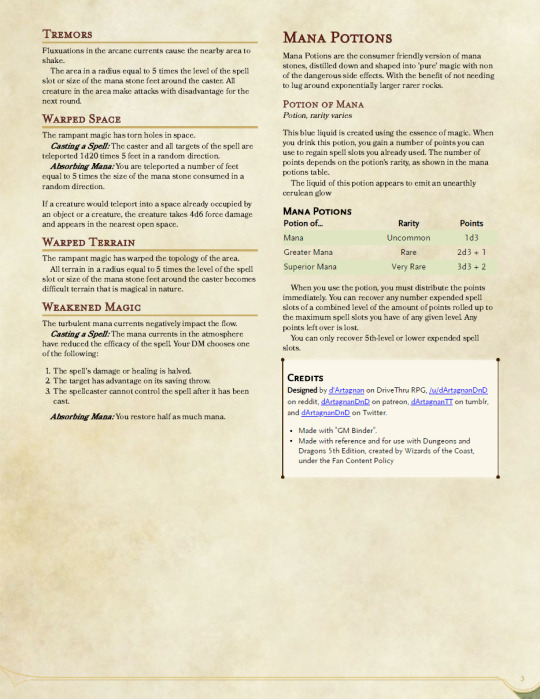
Low-Magic Environments by dArtagnanDnD on reddit
60 notes
·
View notes
Photo
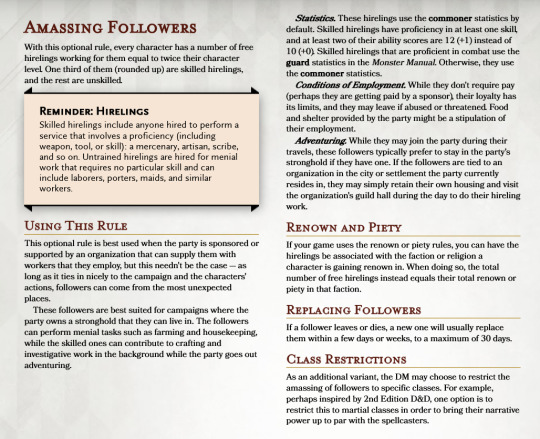
Amassing Followers by badooga1 on reddit
11 notes
·
View notes
Text
Six of Crows au where the crows stay in Ketterdam after the heist (and Matthias is alive obvs) and Colm (Jesper’s father) visits Ketterdam all the time because those kids really need a parent figure like Nina what do you mean you haven’t seen your parents since you were a kid? Excuse me Wylan your father did WHAT NOW?? Matthias what about your family? Dead? Oh. Inej? ‘Somewhere in Ravka’ isn’t that specific. Kaz what do you mean your mother is Ketterdam go get some therapy please. And so Jesper’s dad adopts his son’s whole friend group
#so you know how I said Jes is a James potter variant and James’ parents ‘adopted’ the marauders so Colm is adopting the crows#I don’t make the rules (I do)#six of crows#jesper fahey#kaz brekker#inej ghafa#nina zenik#matthias helvar#wylan hendriks#wylan van eck#colm fahey#crooked kingdom
750 notes
·
View notes
Text
no because why is it always a blonde and a brunette
#and the variant: brunette and redhead#faberry#swan queen#clexa#hollstein#wenclair#brittana#rizzles#supercorp#catradora#villaneve#shoni#rules#cophine#calzona#stena#AND MORE
669 notes
·
View notes
Text
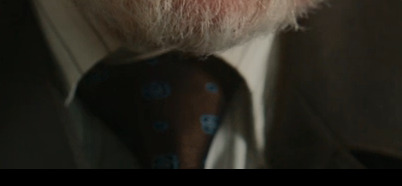
God does not play dice with the universe... but Metatron does
#good omens#good omens s2#good omens season 2#metatron#my musings#metatron the mastermind#good omens s2 spoilers#God does not play dice with the universe; He plays an ineffable game of His own devising#which might be compared#from the perspective of any of the other players [i.e. everybody]#to being involved in an obscure and complex variant of poker#in a pitch-dark room#with blank cards#for infinite stakes#with a Dealer who won't tell you the rules#and who smiles all the time.#good omens analysis
237 notes
·
View notes
Text
Introduce my cool transfemme friend Clare to the internet, fill her with cream and call her an Eclare
#196#r/196#r196#rule#textpost#sambling#shitpost#shitposting#transfemme#trans girl#eclair#eclare#I will not be spelling any other variants of Clair
32 notes
·
View notes
Text
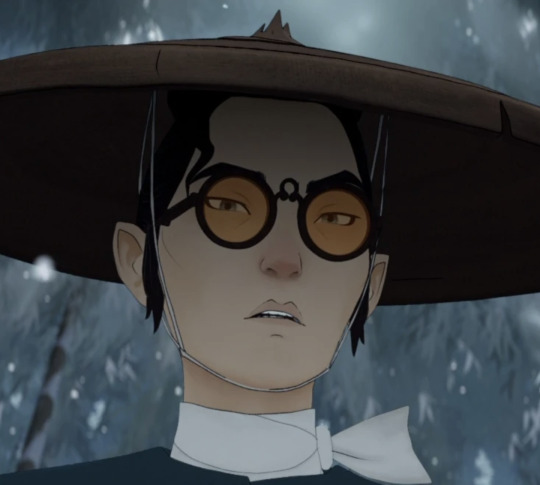
I watched all eight episodes of season 1 of Blue Eye Samurai over the weekend. I then went browsing because I wanted to read some online reviews of the show to see what people were thinking of it and also because I wanted to interact with gifs and art, as the series is visually stunning.
Yet, in my search for opinions on the show, I came across several points I'd like to address in my own words:
Mizu’s history and identity are revealed piece-by-piece and the “peaches” scene with Mizu and Ringo at the lake is intended to be a major character reveal. I think it’s weird that some viewers got angry over other viewers intentionally not gendering Mizu until that reveal, rather than immediately jumping to gender the character as the other characters in the show do. The creators intentionally left Mizu’s gender and sexuality ambiguous (and quite literally wrote in lines to lead audiences to question both) to challenge the viewer’s gut assumption that this lone wolf samurai is a man. That intentional ambiguity will lead to wide and ambiguous interpretations of where Mizu fits in, if Mizu fits in at all. But don't just take my word for this:
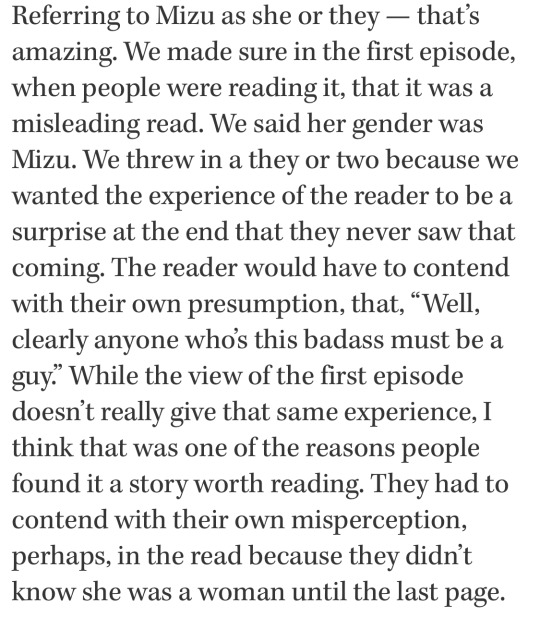
Re: above. I also think it’s weird that some viewers got upset over other viewers continuing to acknowledge that Mizu has a very complicated relationship with her gender, even after that reveal. Canonically, she has a very complicated relationship with her identity. The character is intended to represent liminality in identity, where she’s often between identities in a world of forced binaries that aren’t (widely) socially recognized as binaries. But, again, don’t just take my word for this:
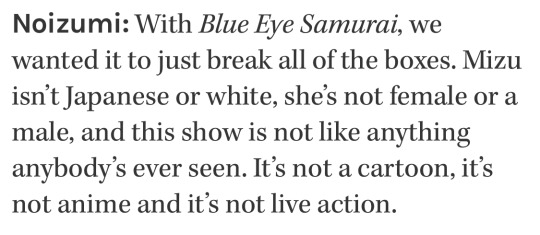
Mizu is both white and Japanese, but she is also not white and not Japanese simultaneously (too white to be Japanese and too Japanese to be white). She’s a woman and a man. She’s a man who’s a woman. She’s also a woman who’s not a woman (yet also not quite a man). But she’s also a woman; the creators said so. Mizu was raised as a boy and grew into a man, yet she was born a girl, and boyhood was imposed upon her. She’s a woman when she’s a man, a man when she’s a man, and a woman when she’s a woman.
Additionally, Mizu straddles the line between human and demon. She’s a human in the sense she’s mortal but a demon in the sense she’s not. She's human yet otherworldly. She's fallible yet greatness. She's both the ronin and the bride, the samurai and the onryō. In short, it’s complicated, and that’s the point. Ignoring that ignores a large part of her internal character struggle and development.
Mizu is intended to represent an “other,” someone who stands outside her society in every way and goes to lengths to hide this “otherness” to get by. Gender is a mask; a tool. She either hides behind a wide-brimmed hat, glasses, and laconic anger, or she hides behind makeup, her dress, and a frown. She fits in nowhere, no matter the identity she assumes. Mizu lives in a very different time period within a very different sociocultural & political system where the concept of gender and the language surrounding it is unlike what we are familiar with in our every-day lives. But, again, don’t just take my word for this:
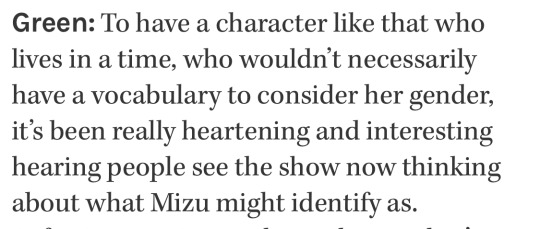
It’s also weird that some viewers have gotten upset over the fact women and queer people (and especially queer women) see themselves in Mizu. Given her complicated relationship with identity under the patriarchy and colonial violence, I think Mizu is a great character for cis-het women and queer folks alike to relate to. Her character is also great for how she breaks the mold on the role of a biracial character in narratives about identity (she’s not some great bridge who will unite everyone). It does not hurt anyone that gender-fluid and nonbinary people see themselves in Mizu's identity and struggle with identity. It does not hurt anyone that lesbians see themselves in the way Mizu expresses her gender. It does not hurt anyone that trans men see themselves in Mizu's relationship with manhood or that trans women can see themselves in Mizu when Mama forces her to be a boy. It's also really cool that cis-het women see themselves in Mizu's struggles to find herself. Those upset over these things are missing critical aspects of Mizu's character and are no different from the other characters in the story. The only time Mizu is herself is when she’s just Mizu (“…her gender was Mizu��), and many of the other characters are unwilling to accept "just Mizu." Accepting her means accepting the complicatedness of her gender.
Being a woman under the patriarchy is complicated and gives women a complicated relationship with their gender and identity. It is dangerous to be a woman. Women face violence for being women. Being someone who challenges sex-prescribed norms and roles under patriarchy also gives someone a complicated relationship with their identity. It is dangerous to usurp gender norms and roles (then combine that with being a woman...). People who challenge the strict boxes they're assigned face violence for existing, too. Being a racial or ethnic minority in a racially homogeneous political system additionally gives someone a complicated relationship with their identity. It is dangerous to be an ethnic minority when the political system is reproduced on your exclusion and otherness. They, too, face violence for the circumstances of their birth. All of these things are true. None of them take away from the other.
Mizu is young-- in her early 20s-- and she has been hurt in deeply affecting ways. She's angry because she's been hurt in so many different ways. She's been hurt by gender violence, like "mama's" misogyny and the situation of her birth (her mother's rape and her near murder as a child), not to mention the violent and dehumanizing treatment of the women around her. She's been hurt by racial violence, like the way she has been tormented and abused since childhood for the way she looks (with people twice trying to kill her for this before adulthood). She's been hurt by state-sanctioned violence as she faces off against the opium, flesh, and black market traders working with white men in contravention of the Shogun's very policies, yet with sanction from the Shogun. She's been hurt by colonial violence, like the circumstances of her birth and the flood of human trafficking and weapons and drug trafficking in her country. She's had men break her bones and knock her down before, but only Fowler sexually differentiated her based on bone density and fracture.
Mizu also straddles the line between victim and murderer.
It seems like Mizu finding her 'feminine' and coming to terms with her 'female side' may be a part of her future character development. Women who feel caged by modern patriarchal systems and alienated from their bodies due to the patriarchy will see themselves in Mizu. They understand a desire for freedom that the narrow archetypes of the patriarchy do not afford them as women, and they see their anger and their desire for freedom in Mizu. This, especially considering that Mizu's development was driven by one of the creators' own experiences with womanhood:
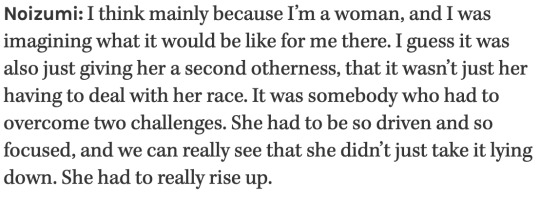
No, Mizu does not pass as a man because she "hates women" or because she hates herself as a woman or being a woman. There are actual on-screen depictions of Mizu's misogyny, like her interactions with Akemi, and dressing like a man is not an instance of this. Mizu shows no discomfort with being a woman or being seen as a woman, especially when she intends to pass herself as and present as a woman. Mizu also shows the women in the series more grace and consideration than any man in the show, in whatever capacity available to her socially and politically, without revealing herself; many of the women have remarked that she is quite unlike other men, and she's okay with that, too.
When she lives on the farm with Mama and Mikio, Mizu shows no discomfort once she acclimates to the new life. But people take this as conclusive evidence of the "only time" she was happy. She was not. This life was also a dance, a performance. The story of her being both the ronin and the onryō revealed to the audience that this lifestyle also requires her to wear a mask and dance, just as the bride does. This mask is makeup, a wedding dress, and submission, and this performance is her gender as a wife. She still understands that she cannot fully be herself and only begins to express happiness and shed her reservation when she believes she is finally safe to be herself. Only to be betrayed. Being a man is her safety, and it is familiar. Being a boy protected her from the white men as a child, and it might protect her heart now.
Mizu shows no discomfort with being known as a woman, except when it potentially threatens her goals (see Ringo and the "peaches" scene). She also shows no discomfort with being known as, seen as, or referred to as a man. As an adult, she seems okay- even familiar- with people assuming she's a man and placing her into the role of a man. Yet, being born a girl who has boyhood violently imposed upon her (she did not choose what mama did to her) is also an incredibly important part of her lived experience. Being forced into boyhood, but growing into a man anyway became part of who she is. But, being a man isn’t just a part of who she became; it’s also expedient for her goals because men and women are ontologically different in her world and the system she lives under.
She's both because she's neither, because- ontologically- she fits nowhere. When other characters point out how "unlike" a man she is, she just shrugs it off, but not in a "well, yeah, because I'm NOT a man" sort of way, but in an "I'm unlike anyone, period," sort of way. She also does not seem offended by Madam Kaji saying that Mizu’s more man than any who have walked through her door.
(Mizu doesn’t even see herself as human, let alone a woman, as so defined by her society. And knowing that creators have stated her future arc is about coming into her “feminine era” or energy, I am actually scared that this show might fall into the trope of “domesticating”/“taming” the independent woman, complete with an allegory that her anger and lack of human-ness [in Mizu’s mind] is a result of a woman having too much “masculine energy” or being masculine in contravention of womanness.)
Some also seem to forget that once Mama and Mikio are dead, no one knows who she is or where she came from. They do not have her background, and they do not know about the bounty on her (who levied the bounty and why has not yet been explained). After their deaths, she could have gone free and started anew somehow. But in that moment, she chose to go back to life as a man and chose to pursue revenge for the circumstances of her birth. Going forward, this identity is no longer imposed upon her by Mama, or a result of erroneous conclusions from local kids and Master Eiji; it was because she wanted people to see her as a man and she was familiar with navigating her world, and thus her future, as a man. And it was because she was angry, too, and only men can act on their anger.
I do think it important to note that Mizu really began to allow herself to be vulnerable and open as a woman, until she was betrayed. The question I've been rattling around is: is this because she began to feel safe for the first time in her life, or is this part of how she sees women ontologically? Because she immediately returns to being a man and emotionally hard following her betrayal. But, she does seem willing to confide in Master Eiji, seek his advice, and convey her anxieties to him.
Being a man also confines Mizu to strict social boxes, and passing herself as a man is also dangerous.
Mizu doesn't suddenly get to do everything and anything she wants because she passes as a man. She has to consider her safety and the danger of her sex being "found out." She must also consider what will draw unnecessary attention to her and distract her from her goals. Many viewers, for example, were indignant that she did not offer to chaperone the mother and daughter and, instead, left them to the cold, only to drop some money at their feet later. The indignity fails consider that while she could bribe herself inside while passing as a man, she could not bribe in two strangers. Mizu is a strange man to that woman and does not necessarily have the social position to advocate for the mother and daughter. She also must consider that causing small social stirs would distract from her goals and draw certain attention to her. Mizu is also on a dangerous and violent quest.
Edo Japan was governed by strict class, age, and gender rules. Those rules applied to men as well as women. Mizu is still expected to act within these strict rules when she's a man. Being a man might allow her to pursue revenge, but she's still expected to put herself forward as a man, and that means following all the specific rules that apply to her class as a samurai, an artisan (or artist), and a man. That wide-brimmed hat, those orange-tinted glasses, and her laconic tendencies are also part of a performance. Being a boy is the first mask she wore and dance she performed, and she was originally (and tragically) forced into it.
Challenging the normative identities of her society does not guarantee her safety. She has limitations because of her "otherness," and the transgression of sex-prescribed roles has often landed people in hot water as opposed to saving them from boiling. Mizu is passing herself off as a man every day of her life at great risk to her. If her sex is "found out" on a larger scale, society won’t resort to or just start treating her as a woman. There are far worse fates than being perceived as a woman, and hers would not simply be a tsk-tsk, slap on the wrist; now you have to wear makeup. Let's not treat being a woman-- even with all the pressures, standards, fears, and risks that come with existing as a woman-- as the worst consequence for being ‘found out’ for transgressing normative identity.
The violence Mizu would face upon being "found out" won’t only be a consequence of being a "girl." Consider not just the fact she is female and “cross-dressing” (outside of theater), but also that she is a racial minority.
I also feel like many cis-het people either ignore or just cannot see the queerness in challenging gender roles (and thus also in stories that revolve around a subversion of sex-prescribed gender). They may not know how queerness-- or "otherness"-- leads to challenging strict social stratifications and binaries nor how challenging them is seen by the larger society as queer ("strange," "suspicious," "unconventional," even "dishonorable," and "fraudulent"), even when "queerness" (as in LGBTQ+) was not yet a concept as we understand it today.
Gender and sexuality- and the language we use to communicate who we are- varies greatly across time and culture. Edo Japan was governed by strict rules on what hairstyles, clothes, and weapons could be worn by which gender, age, and social group, and this was often enshrined in law. There were specific rules about who could have sex with whom and how. These values and rules were distinctly Japanese and would not incorporate Western influences until the late 1800s. Class was one of the most consequential features to define a person's fate in feudal Japan, and gender was quite stratified. This does not mean it's inappropriate for genderqueer people to see themselves in Mizu, nor does this mean that gender-variant identities didn’t exist in Edo Japan.
People in the past did not use the same language we do today to refer to themselves. Example: Alexander The Great did not call himself a "bisexual." We all understand this. However, there is a very weird trend of people using these differences in language and cultures across time to deny aspects of a historical person's life that societies today consider taboo, whether these aspects were considered taboo during that historical time period or not. Same example: people on Twitter complaining that Netflix "made" Alexander The Great "gay," and after people push back and point out that the man did, in fact, love and fuck men, hitting back with "homosexuality wasn't even a word back then" or "modern identity didn't exist back then." Sure, that word did not exist in 300s BCE Macedonia, but that doesn't mean the man didn't love men, nor does that mean that we can't recognize that he'd be considered "queer" by today's standards and language.
Genderqueer, as a word and as the concept is understood today, did not exist in feudal Japan, but the people did and feudal Japan had its own terms and concepts that referred to gender variance. But while the show takes place in Edo Japan, it is a modern adult animation series made by a French studio and two Americans (nationality). Mizu is additionally a fictional character, not a historical figure. She was not created in a vacuum. She was created in the 21st century and co-written by a man who got his start writing for Sex in the City and hails from a country that is in the midst of a giant moral panic about genderqueer/gender-variant people and gender non-conforming people.
This series was created by two Americans (nationality) for an American company. In some parts of that country, there are laws on the book strictly defining the bounds of men and women and dictating what clothes men and women could be prosecuted for wearing. Changes in language and identity over time mean that we can recognize that if Mizu lived in modern Texas, the law would consider her a drag performer, and modern political movements in the show creators' home country would include her under the queer umbrella.
So, yeah, there will also be genderqueer people who see themselves in Mizu, and there will be genderqueer fans who are firm about Mizu being queer to them and in their “headcanons.” The scene setting being Edo Japan, does not negate the modern ideas that influence the show. "Nonbinary didn't exist in Edo Japan" completely ignores that this show was created to explore the liminality of modern racial, gender, class, and normative identities. One of the creators was literally inspired by her own relationship with her biracial identity.
Ultimately, the fact Mizu, at this point in her journey, chooses to present and pass as a man and the fact her presented gender affects relationship dynamics with other characters (see: Taigen) gives this story a queer undertone. And this may have been largely unintentional: "She’s a girl, and he’s a guy, so, of course, they get together," < ignoring how said guy thinks she’s a guy and that she intentionally passes herself as a guy. Audiences ARE going to interpret this as queer because WE don’t live in Edo-era Japan. And I feel like people forget that Mizu can be a woman and the story can still have queer undertones to it at the same time.
#Blue Eye Samurai#‘If I was transported back in time… I’d try to pass myself off as a man for greater freedom.’#^^^ does not consider the intersection of historically queer existence across time with other identities (& the limitations those include)#nor does it consider the danger of such an action#I get it. some come to this conclusion simply because they know how dangerous it is to be a woman throughout history.#but rebuking the normative identities of that time period also puts you at great risk of violence#challenging norms and rules and social & political hierarchies does not make you safer#and it has always been those who exist in the margins of society who have challenged sociocultural systems#it has always been those at greatest risk and who've faced great violence already. like Mizu#Anyway... Mizu is just Mizu#she is gender queer (or gender-variant)#because her relationship with her gender is queer. because she is gender-variant#‘queer’ as a social/political class did not exist. but people WE understand as queer existed in different historical eras#and under different cultural systems#she’s a woman because queer did not exist & ‘woman’ was the sex caste she was born into#she’s also a woman because she conceptualizes herself as so#she is a woman AND she is gender-variant#she quite literally challenges normative identity and is a clear example of what sex non-conforming means#Before the actual. historic Tokugawa shogunate banned women from theater#there were women in the theater who cross-dressed for the theater and played male roles#so I’m also really tired of seeing takes along the lines of: ‘Edo Japan was backwards so cross dressers did’t exist then!’#like. please. be more transparent won’t you?
16 notes
·
View notes
Note
Did you ever go after a version of one of your siblings?
"My siblings... I lost them the day I lost my world... I've met plenty of versions of them since then. I don't really like having to kill some during missions, so Crou is generally the one to do it, while I take care of the ones he doesn't want to kill. We're a great team !"
"So, no, I don't 'go after" any of my siblings. But I have some of them in my collection... Versions that are my new family. I won't lose them again"
Tw: Puppet Gore

#welcome home au#welcome home multiverse#stitcher julie#wh au#wh multiverse#welcome home#wttmv#julie joyful#chit chats#Stitcher has rules when it comes to killing#there are characters she won't touch#or character she will try to befriend first#she also has rules when it comes to her collection#she never killed the puppet in her collection herself#so those siblings variants weren't killed by Stitcher#but what happened then ?#story for an other time
25 notes
·
View notes
Text
Tau codex review copies circulating the rumour mills.
Ehhhhhh....
Not much improved from Index.
Only 4 Detachments (disappointing), Retaliation (Battlesuits/Enclaves), Kroot (Kroot), Mont'ka (Lethal Hits in Early Game, plus assault to guided units), and the index Kauyon (late game bonus/ambush).
Kroot stuff looks Fun, but dang, feel like it could be More.
Also no Gauntlet or Fusion Blades. Irksome.
#tau empire#kroot#tau auxiliaries#rules stuff 40k#warhammer#40k#warhammer petty complaining#........#Stealth Suits got a buff I think#.................#likely GW will move Gaunlet and Blades to their own suit variants.
13 notes
·
View notes
Text
5e Mechanic Variant
I'll admit I don't have every book, nor have I played a ton of systems (6 in total), so I might've just reinvented something that exists. I haven't heard of it though, and its been successful in the sessions I tried it in. It's a variant on 5e's group skill checks.
When the group is trying to do something together, instead of a DC 15 four times, you'd do a DC 15 times four, so DC 60. The players add their results together and see if they can beat the DC. What this does is let the players who specialized in a skill help the others out, instead of rolling a 25 and it being functionally the same as a 15. In my opinion there are two primary types of skill checks that can benefit from this.
The first is "everyone succeeds or we fail" For instance stealth, the paladin clanking behind might not get YOU caught but it will kill the stealth section. Doesn't matter if you got double the DC, you can either go it alone (killing session pacing and abandoning the party) or you can end stealth. Plus everyone is actively looking for you now, so you might suddenly get found anyway. Now the rogue is showing them the proper path or making small distractions to cover the barbarian's stumble. You don't have party members who feel like they failed everyone, and it gives benefit for specializing because you can help the party.
The second is in team checks. Lets say the barbarian wants to topple a stone pillar or push a giant boulder down a hill. He could get advantage from the help action 10 times over, it's not going to make him able to move 4000 lbs of stone. This lets you say "It's like a DC 80, this thing's huge. Then the party gets together and keeps trying (I set a limit on times you can try a strength check before exhaustion) before finally getting that 26+18+14+22 and succeeding. It also lets them know something's technically possible without letting it be within easy reach, giving them a sort of puzzle on how to reach that goal (getting help, using pulleys for advantage, etc)
The closest thing I know of this in 5e is "If half the people make it everyone does", but I find this works better. The basic reason is "You work together and overcome the DC 80 skill check" sounds impressive and feels like everyone contributed to a difficult goal nobody could accomplish on their own. "ok cool, the two specialists passed so we'll just call it a win" makes me feel like you shouldn't have bothered asking everyone to roll, just make it a single person check if my roll is just meaningless.
The more complicated reason- it gives the specialized players a reason to continue their specialization. Think of the Rogue, for an easy example. They chose the sneak class to be good at sneaking, right? well now they're level 11, and they don't get to play anymore. They can't roll lower than a 10 and even a CR 30 can't find them without proficiency in perception. The fun minigame they built a character around becomes "I'd like to-" "Don't bother, you're in the next room now, moving on." Future stealth bonuses don't functionally do much. Also your ranger's still angry because they have high stealth too but don't get to use it.
With this model, keep buffing your stealth, disguise, whatever, it still helps! It lets you lower the effective DC for your friends. And other people who are proud of their score but don't get to use it because you're better? Well they're really useful now too! Use a group deception to infiltrate, the bard patching holes in the fighter's story. Group acrobatics to make that leap, the others benefitting from having a perfect example to copy and someone to correct their form. Sure, in some cases it's not that functionally different from base rule, but it just feels better to me. I recommend at least trying out something like this. It has worked great for me so far.
399 notes
·
View notes
Text
Swedish word order is fairly predictable, as in there's a schema you can fit the various sentence elements into and some of them can go in several different places but there's a structure to it. Except if you're one of the trickster words like not, never or sometimes, then you can do whatever the fuck you want and we had to put special boxes in the schema to accommodate for them. Neat!
#was thinking about the sentence 'jag tror aldrig jag varit där' and how it's technically incorrect#because it means 'i never think i've been there' and not the intended 'i don't think i've been there' - or any number of variants#but in speech i think very few people would take issue with it or interpret it wrong#jag tror att jag aldrig har varit där feels like it ought to be more 'correct' but it feels soooo clunky#idk if there's a good way of phrasing this using aldrig (never). maybe it's more proper to use inte (not)#take ALL uses of 'correct' etc to be used with a heaping spoonful of salt ofc. but i am schooled in general linguistics s well as stylistics#so i think it's fun to compare what's de rigueur and what people actually say#linguistics#swedish stuff#also let's not get started on ju. ju lives by its own rules.
13 notes
·
View notes
Photo


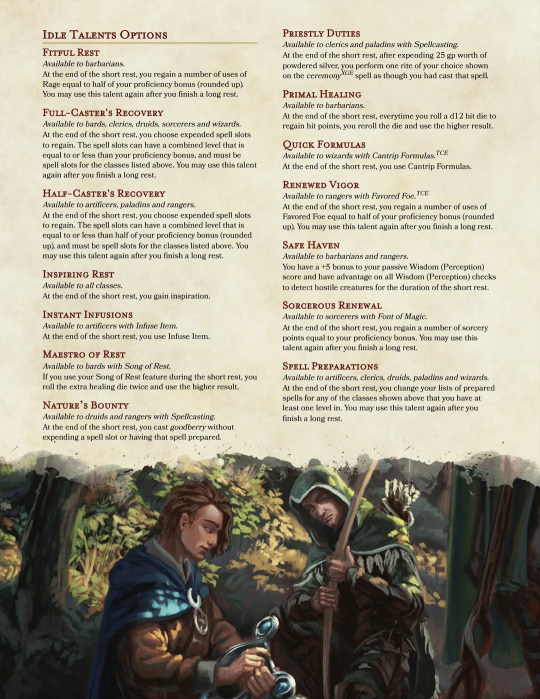

Modified rests by MakeOurDay on reddit
44 notes
·
View notes
Text
Rolling with Emphasis by RAINING_DAYS
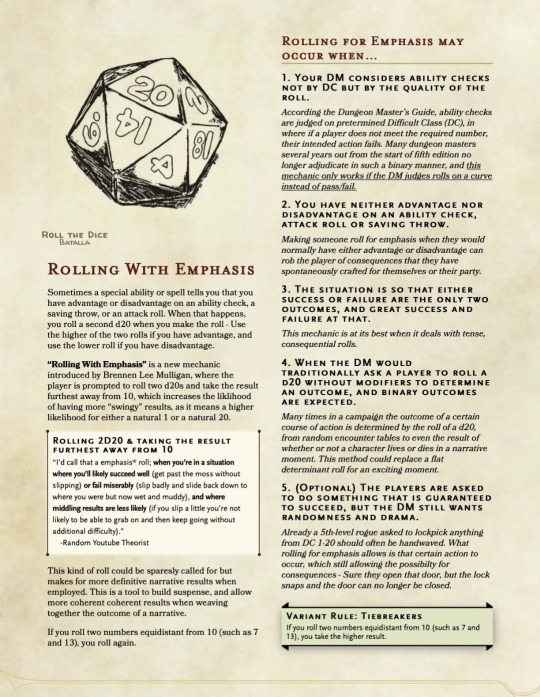
#source linked#linked to source#rolling with emphasis#ruleset#rules#expansion#expanded#alternative#variant#references#reference#ideas#dm#resource#resources
76 notes
·
View notes
Text
now that we know fionna and cake os getting a season 2, fionna babe, that arm has got to go
#sorry i dont make the rules 🤷♀️#now that your universe is canon you are an offical finn variant#and finns are not allowed two arms#adventure time#adventure time fionna and cake#fionna campbell
12 notes
·
View notes
Text
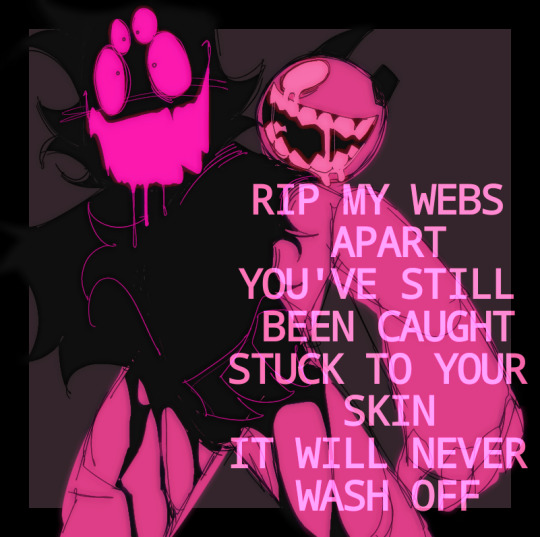
Like can you cut it out
#tw blood#sona shenanigans#aliporsha has had like 3 different sona variants crawl out of his skin i think he needs a vivisection#this is technically vent but in a cool n funny way#pink and black still rules btw not like you forgot
12 notes
·
View notes
Text
6k in and my head is about to explode. STILL not allowed to say what i want :(
#this fic is going to get negative notes i can already tell lmao#the scope of appeal is so stupidly narrow#but That Does Not Matter#i have to believe that#its for ME#its what i want to see and its what makes me happy#i will never put this in a real post because i would be immediately dragged into the square and burned for hypocrisy#but i think its worth saying#this is rasmr specific i dont know about any other fandoms so dont take this as a universal rule#if you go into your favourite tag variant (e.g. 'redacted [x character name]' or 'redacted [genre]')#and sort by 'top' rather than 'latest'#i would like you to scroll down until you find fic#by which i specifically mean PROSE - not bulletpoints or hcs or matchups or those sorts of things#(this is not to say that those things aren't good or worthy of respect - they ARE - but that's not what i'm talking about here)#i would like you to just think about how long it takes you to find a fic in there#because surprise! it's almost certainly longer than you would hope or indeed expect#now........ i wonder why that is?#i don't mean to sound egotistical or selfish or self-aggrandising through all this#but.... you know. fic writers - during their one life on this earth - put in an AWFUL lot of their real time and energy and love into this#into writing things for other people who they will never know or meet to enjoy for FREE on the internet#i don't think you can be surprised that it's a bit disheartening to do all that and then be met with basically silence#it's like cooking for people yk?#some fics are more complex/longer/time-intensive than others - in the way that making a five-course meal is more work than making a sandwic#but if someone made that food for you - whether it was a cookie or an entire christmas dinner - you'd still say thank you...... right?#you wouldn't just take it from them and leave the room - then eat it in total silence where they can't see - and then not say anything...?#if you liked it - or even if you didn't! - wouldn't you still say thank you? wouldn't you tell them that it was nice and you enjoyed it?#that you liked the ingredients they chose or the way they cooked it or the toppings they chose to put on it?#for the sake of everyone whose ever cooked you a meal i hope you would#because i'll tell you something for free - you will be scrolling on that tag for an uncomfortably long time. why is that?#because reblogs/comments/kudos/likes are to fic writers what 'thank you' is to a cook
7 notes
·
View notes